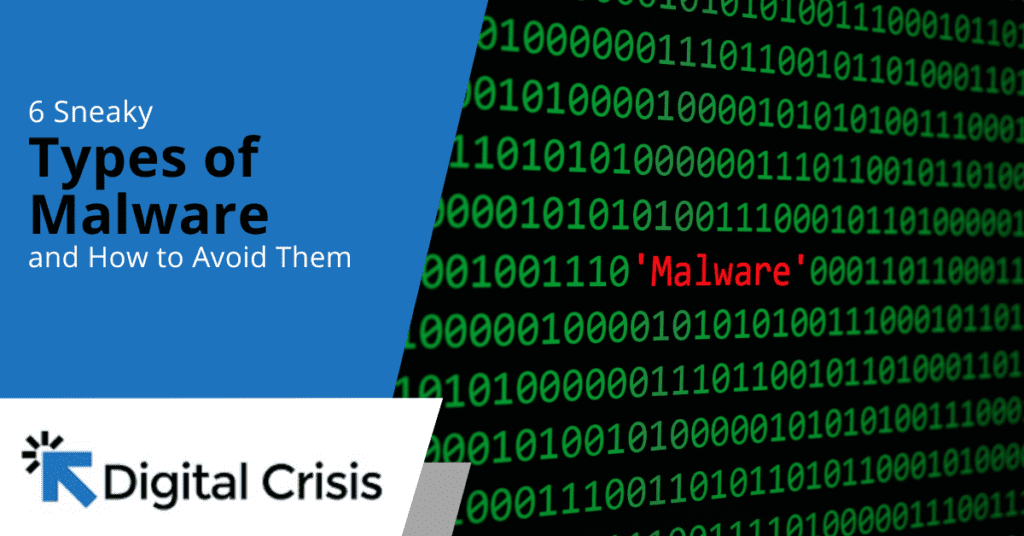
There are a lot of sophisticated and widespread cybersecurity dangers on the internet. Malware is one of these threats that is especially sneaky and can hurt both people and businesses. Cybercriminals can do more damage to you and your valuable data if you don't understand these risks and put strong security measures in place.
This article will review six sneaky types of malware that can ruin your digital life and give you useful advice on how to stay safe from these bad programs.
Malware, short for malicious software, refers to any program or code designed to harm, disrupt, or gain unauthorized access to a computer system. These malicious programs can take various forms and employ different tactics to infiltrate and compromise your devices. The threat posed by malware is significant, as it can lead to data theft, financial loss, system damage, and even identity theft. Next, we’ll talk about specific malware threats and what you can do to protect yourself.
Cybercriminals are constantly evolving their techniques to create more sophisticated and harder-to-detect malware. As our reliance on digital technology grows, so does the potential impact of these threats. Now, we’ll talk about six particularly sneaky types of malware and explore how you can protect yourself against them.
Ransomware is a type of malware that encrypts your files and demands a ransom payment in exchange for the decryption key. This form of malware can be particularly devastating, as it can render your important documents, photos, and other data inaccessible. Ransomware attacks have become increasingly common in recent years, targeting both individuals and large organizations.
To avoid falling victim to ransomware, it's crucial to maintain regular backups of your important files and keep your operating system and software up to date. Additionally, be cautious when opening email attachments or clicking on links from unknown sources, as these are common vectors for ransomware distribution.
Spyware is a type of malware designed to secretly gather information about your activities and transmit it to a third party. This can include keystrokes, browsing history, login credentials, and other sensitive data. The danger of spyware lies in its ability to operate undetected for long periods, potentially exposing your personal and financial information to cybercriminals.
To protect yourself against spyware, consider using reputable anti-malware software and keeping it updated. Be cautious when downloading software from unfamiliar sources, and avoid clicking on suspicious pop-up ads or links. Regular system scans can help detect and remove any spyware that may have infiltrated your device.
Botnets are networks of infected computers controlled by a central command-and-control server. These compromised machines, known as "zombies," can be used to carry out various malicious activities, such as distributed denial-of-service (DDoS) attacks, spam campaigns, or cryptocurrency mining. The insidious nature of botnets lies in their ability to harness the collective power of numerous infected devices without the owners' knowledge.
To avoid becoming part of a botnet, it's essential to maintain strong security practices. This includes using a firewall, keeping your software updated, and being cautious about the websites you visit and the files you download.
Banking Trojans are a specialized form of malware designed to steal financial information, such as online banking credentials, credit card numbers, and other sensitive data. These sophisticated programs often use social engineering tactics to trick users into revealing their login information or can even modify banking websites to capture entered data.
To protect yourself against banking Trojans, always access your online banking services through secure, official channels. Enable two-factor authentication whenever possible, and be wary of emails or messages claiming to be from your bank that request sensitive information. Regular monitoring of your financial accounts can help you detect any suspicious activity early.
Worms are self-replicating malware that can spread rapidly across networks without requiring user interaction. Unlike viruses, which need to attach themselves to files or programs, worms can exploit vulnerabilities in operating systems or applications to propagate independently. This ability to spread quickly makes worms particularly dangerous, as they can infect large numbers of systems in a short time.
To protect against worms, it's crucial to keep your operating system and software up to date with the latest security patches. Using a robust firewall and limiting network shares can also help prevent worm infections from spreading. In our final section, we'll discuss a type of malware that can hide deep within your system, evading detection by traditional security measures.
Rootkits are a particularly insidious form of malware designed to provide unauthorized access to a computer system while actively hiding its presence. These sophisticated programs can modify system files, alter system behavior, and even hide other malicious software from detection. Rootkits often operate at a low level within the operating system, making them extremely difficult to detect and remove using conventional security tools.
Preventing rootkit infections requires a multi-layered approach to security. This includes using reputable antivirus software with rootkit detection capabilities, regularly updating your operating system and applications, and being cautious about the software you install on your system. In some cases, complete system reinstallation may be necessary to remove a deeply entrenched rootkit.
As we've looked at the different kinds of sneaky malware that can threaten your online safety, it's become clear how important it is to stay alert and take action in today's cyber world. You can greatly lower your chances of getting these harmful programs by using strong security measures, keeping your systems up to date, and surfing the web safely.
Remember that cybersecurity is an ongoing process that needs to be watched over and changed as new threats appear. Do not hesitate to contact us at Digital Crisis if you are worried about how malware could affect your business or if you need help putting in place full safety measures. Our team of skilled experts can help you create a personalized security plan to safeguard your important digital assets and give you peace of mind in a world that is becoming more complicated online.